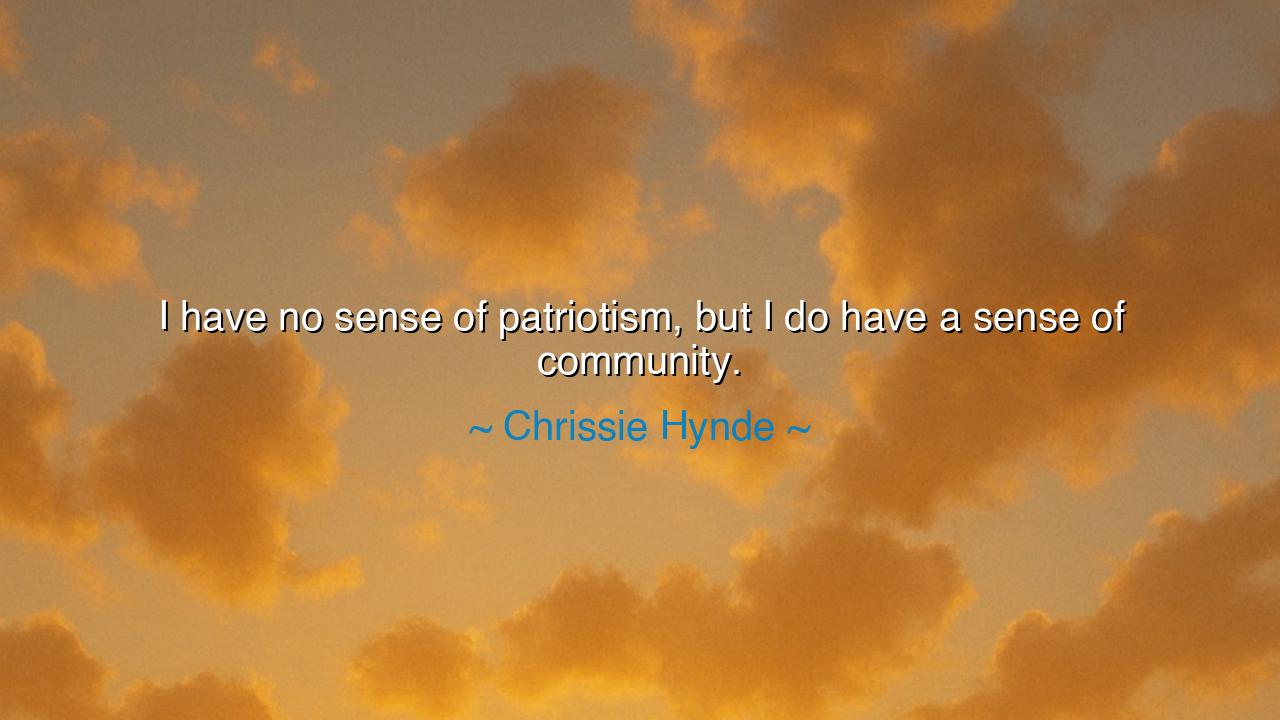
I have no sense of patriotism, but I do have a sense of






The singer and thinker Chrissie Hynde once confessed with disarming clarity: “I have no sense of patriotism, but I do have a sense of community.” These words strike at the heart of a great human tension—the difference between loyalty to an abstract nation and loyalty to the living, breathing people with whom one shares daily life. In her words, we hear not rejection of belonging, but a redirection of devotion. She does not root herself in flags or borders, but in the ties of community, where bonds are forged through love, responsibility, and shared existence.
For the ancients, there was always a struggle between the vast and the near. Patriotism calls the citizen to love the grand structure of the state, to pledge allegiance to rulers, armies, and distant causes. Community, however, calls the heart back to the hearth, the marketplace, the village square, where neighbors care for one another and survival is woven together by shared labor. Hynde reminds us that for some souls, the larger abstraction may seem cold or distant, while the immediate circle of kin, friend, and neighbor feels sacred and real.
History bears witness to this truth. During the Great Depression of the 1930s, countless families across America were cast into poverty. The federal government struggled to respond, and patriotism alone could not fill empty stomachs. Yet in towns and cities, communities banded together—neighbors shared food, churches opened their doors, strangers helped one another find shelter and dignity. It was not the flag alone that sustained the people, but the bonds of community, the immediate compassion that turned despair into endurance. Hynde’s words echo this lesson: it is the closeness of human connection that gives life meaning.
This is not to deny the worth of patriotism. In its pure form, patriotism can inspire courage, sacrifice, and unity in times of great peril. But Hynde’s confession reminds us that love for one’s community is often more tangible, more urgent, and more transformative. A nation may command loyalty through symbols and songs, but a community earns devotion through shared bread, shared burdens, and shared joys. Where patriotism can be distant, community is intimate.
The danger arises when patriotism overshadows community, demanding loyalty to abstractions while ignoring the suffering of those nearby. Too often in history, wars have been waged in the name of country while villages lay in ruins and families starved. Too often leaders have called for patriotic sacrifice while neglecting the basic needs of their people. Hynde’s words call us back to the foundation: before we can love the nation rightly, we must first love those who stand beside us.
The lesson, then, is clear: true strength begins in community. To serve your family, to uplift your neighbors, to care for the weak among you—this is the soil in which the greater ideals of patriotism may one day take root. But without community, patriotism risks becoming empty, a love for a shadow rather than for the flesh and blood of human beings.
Practically, this means living with intention in your daily circle. Share your resources, speak kindly, offer help when it is needed. Create bonds that cannot be shaken by politics or borders. Build trust where you live, for in doing so, you build the foundation of any lasting society. Patriotism may waver with governments and regimes, but community endures as long as human beings choose to stand together.
Thus, let Chrissie Hynde’s words be a torch to light your way: patriotism may inspire from afar, but community sustains you from near. Do not despise one for the other, but never forget that the truest love is proven in action, in how you treat those who share your bread and your road. For a flag may wave above you, but it is the hands of your community that will carry you when you stumble.






AAdministratorAdministrator
Welcome, honored guests. Please leave a comment, we will respond soon